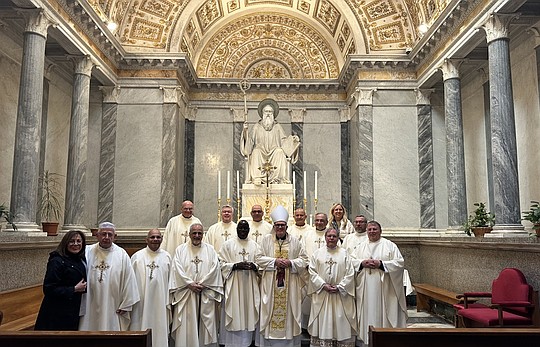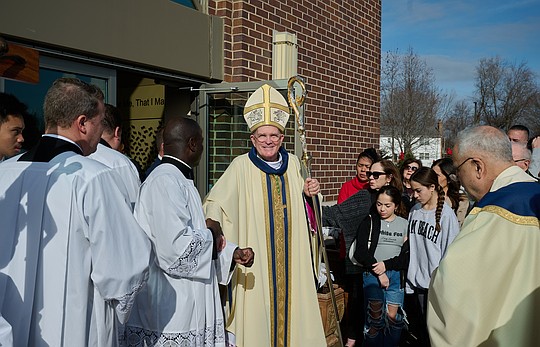Guidelines for making the most of the Lenten season
February 10, 2023 at 8:50 p.m.

During the days and weeks of penance that lie ahead — from Ash Wednesday, Feb. 22, until Holy Thursday, April 6 — the Catholic Church throughout the world commemorates the penitential season of Lent ending with the Sacred Triduum of Holy Week. The model Jesus gave us for “these 40 days” was his own experience in the desert and the temptations that followed him there where he encountered Satan face to face. And yet, Jesus, there in the desert — alone, fasting and in intense prayer — beat back the devil and triumphed over temptation, as strong and as unrelenting as it was throughout those 40 days.
We enter the desert of Lent like Jesus, led by the Holy Spirit, to face our devils, our temptations head on. But we are not alone. The Lord Jesus Christ is with us. And so, too, is the Church, the entire community of faith observing Lent. Here is what the Catholic Church in the United States requires of us as baptized Catholics:
1. The days of FAST (only one full meal) and ABSTINENCE (no meat) are Ash Wednesday and Good Friday. No dispensations are granted on these solemn days except for reason of sickness or those provided in canon law below. ALL OTHER FRIDAYS OF LENT are days of ABSTINENCE.
The pastor of a parish has the faculty to give a dispensation to individual parishioners in his parish and the Diocesan Bishop alone has the authority to dispense groups of Catholics but only for a serious reason.
DISPENSATION FOR MARCH 17.
2. Those who are automatically dispensed from fast and abstinence regulations outside the age limits noted below include: the physically or mentally ill, especially individuals suffering from chronic illnesses such as diabetes. Also included in the dispensation are women who are pregnant or nursing. In all cases, common sense should prevail, and ill persons should not further jeopardize their health by fasting.
Those between the ages of 18 and 59 are obliged to FAST (only one full meal) as above. From the age of 14, people are also obliged to ABSTAIN (no meat): this obligation prohibits the eating of meat, but not eggs, milk products or condiments of any kind, even though made from animal fat).
The obligation to observe the laws of fast and abstinence is a serious one for Catholics. Failure to observe one penitential day in itself is not considered a serious sin. It is the intentional failure to observe any penitential days at all, or a substantial number of penitential days, that must be considered a serious matter.
The obligation, the privilege really, of receiving the Eucharist at least once a year — often called “Easter duty” — for those in the state of grace should still be fulfilled during the period from the First Sunday of Lent, Feb. 25-26, to Trinity Sunday, June 3-4. However, the Church’s law does permit this precept to be fulfilled at another time during the year when there is a just cause.
I want to encourage all Catholics, especially those who are conscious of serious sin, to go to Confession and to make use of the sacrifices and traditions that have always been part of our Lenten practices in the Church.
We do, indeed, fast and pray with the Lord Jesus and with our fellow Catholics. May this Lent be a time of penance leading to grace and joy for us all at Easter.
Sincerely yours in Christ,
Most Reverend David M. O’Connell, C.M.
Bishop of Trenton
Related Stories
Saturday, January 03, 2026
E-Editions
Events
During the days and weeks of penance that lie ahead — from Ash Wednesday, Feb. 22, until Holy Thursday, April 6 — the Catholic Church throughout the world commemorates the penitential season of Lent ending with the Sacred Triduum of Holy Week. The model Jesus gave us for “these 40 days” was his own experience in the desert and the temptations that followed him there where he encountered Satan face to face. And yet, Jesus, there in the desert — alone, fasting and in intense prayer — beat back the devil and triumphed over temptation, as strong and as unrelenting as it was throughout those 40 days.
We enter the desert of Lent like Jesus, led by the Holy Spirit, to face our devils, our temptations head on. But we are not alone. The Lord Jesus Christ is with us. And so, too, is the Church, the entire community of faith observing Lent. Here is what the Catholic Church in the United States requires of us as baptized Catholics:
1. The days of FAST (only one full meal) and ABSTINENCE (no meat) are Ash Wednesday and Good Friday. No dispensations are granted on these solemn days except for reason of sickness or those provided in canon law below. ALL OTHER FRIDAYS OF LENT are days of ABSTINENCE.
The pastor of a parish has the faculty to give a dispensation to individual parishioners in his parish and the Diocesan Bishop alone has the authority to dispense groups of Catholics but only for a serious reason.
DISPENSATION FOR MARCH 17.
2. Those who are automatically dispensed from fast and abstinence regulations outside the age limits noted below include: the physically or mentally ill, especially individuals suffering from chronic illnesses such as diabetes. Also included in the dispensation are women who are pregnant or nursing. In all cases, common sense should prevail, and ill persons should not further jeopardize their health by fasting.
Those between the ages of 18 and 59 are obliged to FAST (only one full meal) as above. From the age of 14, people are also obliged to ABSTAIN (no meat): this obligation prohibits the eating of meat, but not eggs, milk products or condiments of any kind, even though made from animal fat).
The obligation to observe the laws of fast and abstinence is a serious one for Catholics. Failure to observe one penitential day in itself is not considered a serious sin. It is the intentional failure to observe any penitential days at all, or a substantial number of penitential days, that must be considered a serious matter.
The obligation, the privilege really, of receiving the Eucharist at least once a year — often called “Easter duty” — for those in the state of grace should still be fulfilled during the period from the First Sunday of Lent, Feb. 25-26, to Trinity Sunday, June 3-4. However, the Church’s law does permit this precept to be fulfilled at another time during the year when there is a just cause.
I want to encourage all Catholics, especially those who are conscious of serious sin, to go to Confession and to make use of the sacrifices and traditions that have always been part of our Lenten practices in the Church.
We do, indeed, fast and pray with the Lord Jesus and with our fellow Catholics. May this Lent be a time of penance leading to grace and joy for us all at Easter.
Sincerely yours in Christ,
Most Reverend David M. O’Connell, C.M.
Bishop of Trenton










